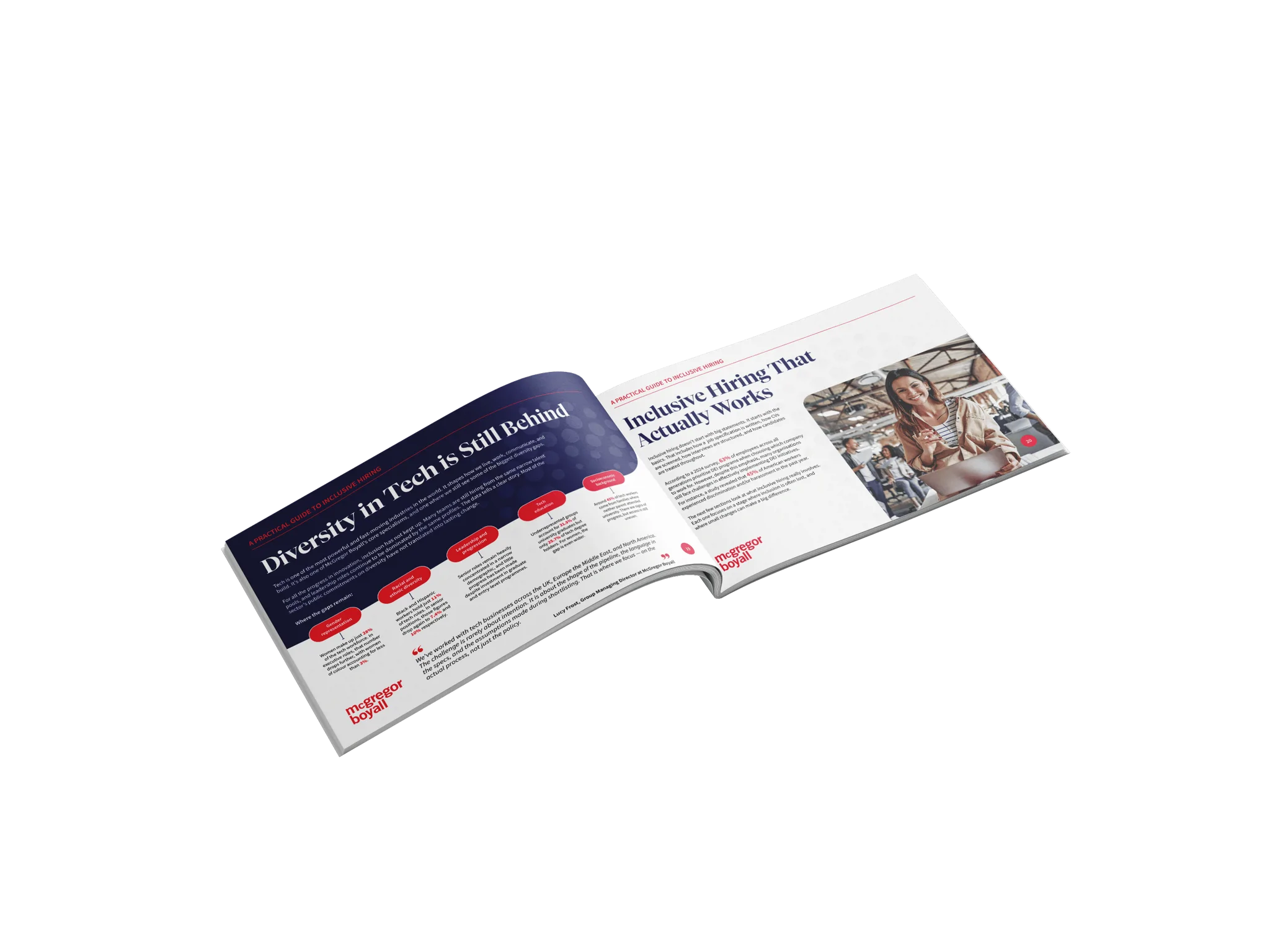Article
Navigating Benefits Packages for Tech Contract Jobs
10 May, 20249 min
Contract work in the tech industry is a recent development, providing flexibility and opportunities for employers and workers. However, grasping the ins and outs of workplace benefits packages for contract workers can be complex as regulations and expectations are still taking shape. Unlike traditional employment setups, contract work introduces distinctive considerations. Employers and workers alike must navigate evolving regulations and industry norms to ensure that workplace benefits packages remain equitable and attractive.
As the gig economy expands and the nature of work evolves, the rules surrounding workplace benefits for contract workers continue to develop. Unlike in permanent positions, where workplace benefits are often straightforward, contract work introduces a range of factors to consider, such as project durations and fluctuating workloads. Staying informed about changes in regulations and industry standards is essential for employers and workers to design workplace benefits packages that effectively meet the needs of both parties.
This guide discusses essential aspects of workplace benefits packages for tech contract workers, including healthcare, retirement plans, paid time off, and other perks. By understanding these fundamentals and staying informed about evolving trends, employers and workers can make informed decisions that support their mutual interests.
Understanding Entitlement VS Perks
Tech contract workers, unlike permanent employees, are typically entitled only to statutory benefits. These workplace benefits provide a foundational safety net, including paid time off, sick pay, and workplace pensions. In contrast, contractual workplace benefits are additional workplace benefits employers offer to support contract tech talent's development, well-being, and interests.
These workplace benefits include health insurance, professional development opportunities, flexible work arrangements, and more tailored to the unique needs of contract workers. But why should your organisation provide workplace benefits packages for contract tech talent when you aren’t legally obligated to do so?
Let’s discuss this below.
Current Climate: Why It Matters
In today's competitive talent environment, where the war for tech talent is fierce, offering comprehensive workplace benefits packages is crucial for organisations. The tech industry faces a significant talent shortage, projected to worsen by 2030, with a global deficit of over 85 million tech workers. Companies are competing vigorously to attract and retain skilled tech contract workers, making it essential to stand out.
Providing attractive workplace benefits helps attract top talent, enhances retention rates, motivates and boosts productivity, and strengthens the organisation's reputation as an employer of choice in the tech industry.
The talent competition has intensified as companies vie for skilled professionals to drive innovation and growth. With the projected shortfall of tech workers, organisations must differentiate themselves to secure the talent needed to remain competitive. Offering competitive workplace benefits has become a strategic imperative for companies seeking to attract and retain top tech talent.
By providing attractive perks and incentives, organisations can position themselves as employers of choice, thereby gaining a competitive edge in the talent market.
Beyond Statutory
While statutory workplace benefits provide a baseline, negotiating contractual workplace benefits and considering the overall compensation package is vital for tech contract workers. By understanding their entitlements and the competitive environment, contract workers can secure the best workplace benefits for their career journey.
Negotiating for additional perks such as health insurance, retirement plans, professional development funds, and flexible work arrangements can significantly enhance the overall compensation package for contract workers.
Providing comprehensive workplace benefits packages can also offer specific advantages for employers, including:
- Attracting Top Talent: Competitive workplace benefits help attract tech talent, ensuring the organisation can hire the best contractors available.
- Retention: Offering appealing workplace benefits contributes to higher retention rates among tech contract workers, reduces turnover costs, and ensures project continuity.
- Motivation and Productivity: Comprehensive workplace benefits packages motivate tech contractors, boosting morale and productivity and improving project outcomes.
- Positive Reputation: Providing competitive workplace benefits enhances the organisation's reputation as an employer of choice in the tech industry, attracting more talent and strengthening the employer brand.
- Risk Mitigation: Offering workplace benefits such as health insurance and retirement plans helps mitigate risks associated with talent shortages and project disruptions, ensuring a stable and committed workforce.
Offering comprehensive workplace benefits contract workers and employers, helping them attract and retain top talent, enhance productivity, strengthen their reputation, and mitigate risks in a competitive tech environment.
By prioritising the well-being and satisfaction of their contract workers, organisations can position themselves for long-term success and maintain positive relationships with contract tech talent.
But how do you implement this, providing fair, beneficial, and attractive workplace benefits without using unnecessary resources? How do you balance these tech contractor workplace benefits against your FTE permanent employees?
Let’s explore this in the below section.

Evaluating Benefits Packages for Effective Hiring Practices
Creating a comprehensive workplace benefits package tailored to the needs of contract tech talent begins with understanding their unique preferences and priorities. Unlike permanent employees, contract workers prioritise flexibility, autonomy, and compensation. They seek opportunities for professional growth, recognition, and work-life balance. Employers must gain insights into these preferences to design workplace benefits packages that attract and retain top contract talent.
Evaluating Benefits Packages
Before designing a workplace benefits package, employers must evaluate the options available and assess their relevance to contract tech talent. This involves considering factors such as skill level, industry standards, budget constraints, and legal requirements.
Employers should conduct market research to understand prevailing compensation rates, benefit offerings by competitors, and industry trends. Gathering feedback from current and prospective contract workers is also essential to identify the most valued workplace benefits and areas for improvement.
Tailoring Benefits to Individual Preferences
Once the evaluation is complete, employers can begin tailoring workplace benefits to meet the individual preferences of contract tech talent. This requires a personalised approach considering each contractor's unique needs, priorities, and circumstances.
Employers should offer flexibility in benefit options, allowing contractors to choose workplace benefits that align with their preferences and lifestyles. By providing a customisable workplace benefits package, employers demonstrate their commitment to supporting the diverse needs of contract tech talent.
Examples of tailored benefits include:
- Flexible Compensation Structures: Employers can offer flexible compensation structures that allow contractors to choose between higher hourly rates, performance-based bonuses, or project-based incentives. This gives contractors more control over their earnings and rewards their contributions based on performance.
- Personalised Professional Development Opportunities: Employers can tailor professional development opportunities to contract tech talent's specific interests and career goals. This may include access to specialised training programs, certifications, or mentorship opportunities that align with the contractor's skill set and aspirations.
- Customisable Work Arrangements: Recognising the importance of work-life balance, employers can offer customisable work arrangements such as options for remote work, flexible scheduling, or compressed work weeks. This allows contractors to balance their professional commitments with personal responsibilities.

Building a Robust Benefits Package Offering
Now that we've explored how to evaluate benefit offerings, let's implement these strategies. It is crucial to understand which workplace benefits you might consider offering and why they're important. Remember that while we provide examples, it's essential to tailor your workplace benefits packages to fit your organisation and the needs of your contract workers.
Competitive Compensation
Offering competitive hourly rates is vital for attracting top talent. In a competitive market, fair compensation ensures that your offer remains attractive within the industry. According to a recent study, 64% of technology professionals consider salary the most crucial factor when considering a job offer. Therefore, prioritising fair compensation is essential to attract and retain skilled contract workers.
Ensure you keep updated with the latest payment and compensation rates for tech contract workers in different roles and skill levels. You can use job platforms like LinkedIn and Indeed to compare salaries or contact an experienced contract recruiter to assist you with wages.
Project Flexibility
Contract workers highly value flexibility. Providing them with control over project scope and deadlines encourages a sense of autonomy and trust. Employees who feel empowered to manage their work have higher engagement and job satisfaction. Therefore, offering project flexibility can increase productivity and job satisfaction among contract workers.
You can offer project flexibility and flexible working in general by including the following in your workplace benefits packages:
- Flexible Hours: Allow contract workers to set their work hours within reasonable limits. This enables them to effectively balance work and personal commitments, fostering a healthier work-life balance.
- Remote Work Options: Offer the flexibility to work remotely, full-time or part-time. Remote work eliminates location constraints, allowing contract workers to work from wherever they feel most productive.
- Project-Based Contracts: These contracts are structured based on specific projects rather than fixed terms. This approach allows contract workers to choose projects that align with their skills and interests.
Professional Growth and Support
Investing in the professional growth of contract workers demonstrates your commitment to their development and encourages loyalty. According to LinkedIn's Workplace Learning Report, 94% of employees say they would stay at a company longer if it invested in their career development.
By providing access to training resources and opportunities for skill development, you not only enhance the capabilities of your contract workers but also increase their likelihood of staying with your organisation.
Positive Work Environment and Recognition
Creating a positive work environment where contract workers feel valued is crucial for job satisfaction and productivity. Research conducted by Harvard Business Review found that companies with a positive work culture experienced higher levels of employee engagement, lower turnover rates, and increased profitability.
Supporting a positive work environment and recognising the contributions of contract workers can lead to higher levels of job satisfaction and retention.
In-House Development Opportunities and Perks
Tech contract workers often worry about their financial security, especially in retirement. Offering them pensions can be a game-changer. This benefit, along with opportunities to develop their skills (working with new technology and diverse projects) and the flexibility of remote work (where applicable), can make your company much more attractive to these talented individuals.
Pensions offer peace of mind. They know your company cares about their long-term well-being, which builds loyalty and trust. Here's how you can make this happen:
- For PAYE contractors, allow them to participate in your workplace pension scheme (if eligible).
- Limited company contractors and sole traders guide setting up private pension plans.
This approach shows your commitment to your entire workforce, both full-time and contract and positions your company as a leader in attracting top tech talent.
Evaluation and Tailoring of Benefits Packages
Continuously evaluating and tailoring workplace benefits packages based on the evolving needs of contract workers is essential for maintaining their engagement and satisfaction. Regular feedback sessions and surveys can provide valuable insights into areas for improvement. By staying informed about industry trends and benchmarking against competitors' offerings, you can ensure that your workplace benefits packages remain competitive and attractive to contract workers.
By prioritising competitive compensation, project flexibility, professional growth opportunities, a positive work environment, and tailored workplace benefits packages, you can enhance the satisfaction and productivity of your contract workers, ultimately contributing to the success of your organisation.
Attracting Tech Contractors: Final Thoughts on Optimal Benefits
Navigating workplace benefits packages for contract tech workers is essential for employers and employees. This guide has provided valuable insights into the various options, including statutory benefits, contractual perks, and the competitive environment.
While statutory workplace benefits offer a baseline, it's crucial to recognise the importance of negotiating contractual workplace benefits to ensure a fulfilling career journey. Employers should strive to provide competitive compensation, project flexibility, and opportunities for professional growth and support to attract and retain top tech talent.
By integrating these strategies and prioritising the well-being and satisfaction of their contract employees, employers can stand out in the competitive tech industry and secure the talent needed to drive innovation and success in their projects.
Helping you to Unlock Your Contract Workforce Potential
Are you interested in crafting competitive workplace benefits for your tech contract team? At McGregor Boyall, we specialise in contract recruitment across various sectors, facilitating business transformation and productivity boosts for our clients. Collaborating with FTSE 100 companies, we've placed contractors who provide ongoing project support. Let us guide you through the hiring journey to connect with candidates that match your business objectives.
Reach out to us today to explore our services further.



